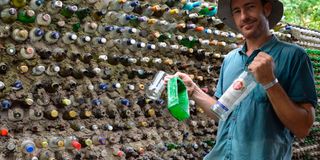Combating ocean pollution one plastic bottle at a time

Attye Pye, a sustainability expert, shows some of the plastic and glass waste products he collects from the Indian Ocean to reduce ocean pollution.
What you need to know:
- The world generates around 350 million tonnes of plastic waste per year, according to Our World in Data, a research organisation.
- That means that around two per cent of waste is traded.
As he steps into one of the beachfront hotels along the South Coast in Mombasa, he may easily be mistaken as a tourist checking in to explore Africa.
But Atty Pye, 41 is a man on a mission not only in the South Coast but the entire coastal city of Mombasa. After alighting from his vehicle, he heads to the reception and tells the receptionist: "I am collecting trash.”
The South Coast is where you will find the highest-level luxury resorts, hotels and island lodgings that dot the Mombasa shoreline and stretch as far as the eye can see, meeting the blue sky on the horizon.
Pye is seeking to combat climate change and improve marine conservation by creating awareness on the seaside and private islands located in distinct areas of the coastal city to help hotel owners reduce the impact of waste from their businesses. “I find ways to utilise waste from hotels to reduce its impact on marine ecosystem,” said Pye.
Pye has a team of young people who are removing plastic waste from the ocean and transforming it into useful new products. “We have a plastic extruder and a shredder and using recycled ocean plastics, we make curios and glass products to raise awareness of the value of plastic waste,” explained Pye.
“I believe this is a significant step to fight plastic pollution. We hope that we can inspire others to do the same,” said Pye.
Pye, a sustainability expert, said his team separates the waste they collect from the ocean into 13 different types including plastic, glass, metal and nylon.
“We do this deliberately because we have an organic farm. We take all our food and fruit waste and turn it into compost for growing vegetables. We feed all the leftover food to our chicken and get eggs. All this is healthy. We’re cutting down the cost of running our business,” said Pye.
“We are also rooting for a circular economy to realise the Sustainable Development Goals and Kenya’s Vision 2030.”
Currently, there are 75 to 199 million tonnes of plastic polluting oceans globally, according to the World Economic Forum.
This is a result of humans recycling only a paltry nine per cent of plastic waste and dumping 10 million tonnes of it into the oceans each year.
Sustainable waste management experts warn that if we continue on this path, the annual flow of plastic into the ocean could triple by 2040 as plastic production continues to increase.
The largest share of plastic, which is more than 80 per cent that enters the oceans, comes from rivers in Asia. In 2020, around five million tonnes of plastic waste was traded globally.
The world generates around 350 million tonnes of plastic waste per year, according to Our World in Data, a research organisation. That means that around two per cent of waste is traded.
“Marine plastic pollution may be costing the world economy trillions of dollars every year because it affects fisheries, coastlines, tourism, marine life, and the food we eat,” said Pye.
According to Kenya Marine and Fisheries Research Institute Director-General James Njiru, the institute's findings show that 37,000 metric tonnes of plastic get into the Indian Ocean annually.
This has caused the death of marine animals such as fish and turtles as a result of suffocation from plastics.
Pye says he has been working to end ocean pollution for the last seven years and is not about to call it quits.
“Ending plastic pollution is my main goal,” says Pye, who has set up a consultancy firm to help hotels in the Coast region fight marine pollution.
“We all must reduce plastic pollution and the best way to start is to involve hotels and convert them into green hubs. I am also training communities on how to use compost to make fertiliser and this is aimed at helping them to save money instead of buying conventional fertiliser and pesticides which are harmful to the environment,” said Pye.
According to the Intergovernmental Oceanographic Commission of UNESCO, plastic waste makes up 80 per cent of all marine pollution, and around eight to 10 million metric tons of plastic end up in the ocean each year.
The Environmental Protection Agency states that 100 per cent of all plastics that human beings have ever created are still in existence. Research states that by 2050, plastic will likely outweigh all fish in the sea. Currently, there are about 50-75 trillion pieces of plastic and microplastics in the ocean.


